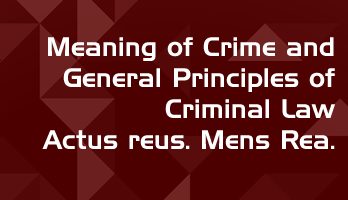Free Full Course Available on LawMint's YouTube Channel
How to Land Your Dream LLB Internship in a Top Law Firm
- Part 1 - Introduction
- Part 2 - Internship Planning
- Part 3 - Internship Research
- Part 4 - Building Your Profile
- Part 5 - The Email
- Part 6 - The Resume
- Part 7 - The Cover Letter
- Part 8 - The Interview
- Part 9 - Self Development
Practical and comprehensive course, with real examples and step-by-step analysis of the complete internship application process. Check out LawMint's YouTube channel now!
This article will explain various remedial measures available in the Civil as well as in Criminal cases.
Remedies are of four types :
- Damages
- Restitution
- Coercive
- Declaratory
Remedies in Civil Law
In the civil matters the remedies are mostly of monetary in nature. These matters have remedies of compensation of the actual loss, pain and sufferings and legal costs.
The various types of remedial measures are as follows :
Compensation
It is a remedy provided to the victim for the actual loss, pain and suffering being undergone. The law penalizes the wrong-doer by awarding the compensation to the victim to compensate for the loss and pain and suffering.
Specific Relief
‘Specific Relief’ is contained in the Specific Relief Act I of 1877, before the passing of the Specific Relief Act the law as to Specific Relief was contained in Sections 15 and 192 of the Civil Procedure Code (Act VIII) of 1859.
The ‘relief’ is called specific because it is relief in specie i.e. in terms of the very thing to which a suitor is entitled. It is a remedy where law allows to a person whose right has been invaded. The forms of ‘Specific Relief’ are of :
(a) taking possession of property and delivering it to the claimant who is out of possession,
(b) requiring performance of contract,
(c) compelling the performance of statutory duty and (d) preventing the doing of wrong.
Thus, ‘Specific Relief’ to be granted only for enforcing individual civil rights and not for enforcing penal laws.
The Civil Law is both facilitating and enabling as the stringent laws are facilitating victims to organised as well as at the same time it is enabling them to raise their voices and contest a case in court of law to seek justice.
Remedies in Criminal Law
In the criminal matters the remedies are often known as sentences. These matters have remedies of compensation of the actual loss, pain and sufferings and legal costs. The various types of remedial measures are as follows:
Compensation
Compensation is a remedy provided to the victim for the actual loss, pain and suffering being undergone. The law penalizes the wrongdoer by awarding the compensation to the victim to compensate for the loss and pain and suffering.
Many a times it has been observed by the Hon’ble courts that only money compensation is not enough so in such case(s) the punitive damages are given as a sentence. Under punitive damage sentence the court may order fine plus imprisonment.
For example, in case of violation of rule of Indian Railways the court may pass a sentence of punitive damage in nature as per the nature of offence.
Specific Relief
Specific relief is contained in the Specific Relief Act I of 1877, before the passing of the Specific Relief Act the law as to Specific Relief was contained in Sections 15 and 192 of the Civil Procedure Code (Act VIII) of 1859.
The relief is called specific because it is relief in specie i.e. in terms of the very thing to which a suitor is entitled. It is a remedy where law allows to a person whose right has been invaded. The forms of ‘Specific Relief’ are of
(a) taking possession of property and delivering it to the claimant who is out of possession,
(b) requiring performance of contract,
(c) compelling the performance of statutory duty and (d) preventing the doing of wrong.
Thus, ‘Specific Relief’ to be granted only for enforcing individual civil rights and not for enforcing penal laws.
The Criminal Law is both facilitating and enabling as the stringent laws are facilitating victims to organised as well as at the same time it is enabling them to raise their voices and contest a case in court of law to seek justice.
Questions
Explain the ‘remedies’ available in civil matters.
(a) Compensation
(b) Specific Relief
Define the terms (a) Compensation (b) Specific Relief.
(a) ‘Compensation’ is a remedy provided to the victim for actual loss, pain and suffering being undergone.
(b) The ‘Specific Relief’ is a remedy provided to the victim under the Specific Relief Act, 1877. It is a remedy where law allows specific relief to a person whose right has been invaded.
The relief is called ‘Specific’ because it is a relief in terms of the very thing to which a ‘suitor’ is entitled.
Free Full Course Available on LawMint's YouTube Channel
How to Land Your Dream LLB Internship in a Top Law Firm
- Part 1 - Introduction
- Part 2 - Internship Planning
- Part 3 - Internship Research
- Part 4 - Building Your Profile
- Part 5 - The Email
- Part 6 - The Resume
- Part 7 - The Cover Letter
- Part 8 - The Interview
- Part 9 - Self Development
Practical and comprehensive course, with real examples and step-by-step analysis of the complete internship application process. Check out LawMint's YouTube channel now!












